

JUNE • VOL. 6 • SERIES OF 2023
INSIGHTS is a monthly publication of BDB LAW to inform, update and provide perspectives to our clients and readers on significant tax-related court decisions and regulatory issuances (includes BIR, SEC, BSP, and various government agencies).

DISCLAIMER: The contents of this Insights are summaries of selected issuances from various government agencies, Court decisions, and articles written by our experts. They are intended for guidance only and as such should not be regarded as a substitute for professional advice.
Copyright © 2023 by Du-Baladad and Associates (BDB Law). All rights reserved. No part of this issue covered by this copyright may be produced and/or used in any form or by any means – graphic, electronic, and mechanical without the written permission of the publisher.
What's Inside ...
- HIGHLIGHTS FOR JUNE 2023
- SIGNIFICANT COURT DECISIONS
- Supreme Court
- Court of Tax Appeals
- SIGNIFICANT REGULATORY ISSUANCES
- Bureau of Internal Revenue
- Securities and Exchange Commission
- Bangko Sentral ng Pilipinas
- Insurance Commission
- PUBLISHED ARTICLE
- Ripples of Premature Tax Collection
- OUR EXPERTS
- The Personalities
- The Personalities


HIGHLIGHTS for MAY 2023
SUPREME COURT DECISIONS
-
The CTA has jurisdiction to decide not only cases on disputed assessments and refunds of internal revenue taxes, but also "other matters" arising under the NIRC. (Commissioner of Internal Revenue vs. Manila Medical Services, Inc., G.R. No. 255473, February 13, 2023)
-
RE Developers must meet certain standards and must register with the DOE before they can be considered as RE Developers duly entitled to fiscal incentives, such as entitlement to zero-rated sales. (CBK Power Co. Limited v. Commissioner of Internal Revenue, G.R. No. 247918, February 1, 2023).
-
In the absence of a law expressly and unambiguously imposing excise tax on alkylate, the appropriate rule to be applied is the strict interpretation in the imposition of taxes such that the statute must be construed most strongly against the government and in favor of the taxpayer. (Petron Corporation v. Commissioner of Internal Revenue, G.R. No. 255961, March 20, 2023)
COURT OF TAX APPEALS DECISIONS
-
The resulting DST assessment under an LOA covering all income tax except DST is null and void. (Sun Life Grepa Financial, Inc. v. Commissioner of Internal Revenue, C.T.A. Case No. 10080, May 9, 2023)
-
The issuance of a FAN/FLD before the lapse of the 15-day period to file a reply to the PAN is a violation of the taxpayer’s right to due process rendering the assessment void. (D.M. Wenceslao & Associates, Inc. v. Commissioner of Internal Revenue, C.T.A. Case No. 9764, May 9, 2023)
-
It is settled that a party cannot, on appeal, change fundamentally the nature of the issue in the case. When a party deliberately adopts a certain theory and the case is decided upon that theory, he will not be permitted to change the same on appeal. (Commissioner of Internal Revenue v. First Philippine Utilities Corporation, CTA EB No. 2500 (CTA Case No. 9431), May 24, 2023)
-
All loan agreements, whether made or signed in the Philippines or abroad, when the obligation or right arises from Philippine sources or the property or object of the contract is located in the Philippines, shall be subject to the payment of DST. (Bloomberry Resorts Corporation v. Commissioner of Internal Revenue, CTA Case No. 10193, May 28, 2023)
-
The validity of the final assessment is a distinct matter from the issue of prescription of collection of taxes. (Commissioner of Internal Revenye and BIR Regional Director, Region 12, Bacolod City vs. Anapi Multi-Purpose Cooperative, CTA EB No. 2543 (CTA Case No. 9787, May 11, 2023)
-
If revenue generation is the primary purpose and regulation is merely incidental, the imposition is a tax; but if regulation is the primary purpose, the fact that incidental revenue is also obtained does not make it an imposition of a tax. (Dole Philippines Inc. – Stanfilco Division vs. The Sangguniang Panlusod of the City of Davao et al., CTA EB No. 2461 (CTA AC No. 25, May 12, 2023)
BIR ISSUANCES
- RR No. 5-2023, May 7, 2023 – This amends RR No. 5-2021 on the requirements for availing the Income Tax exemption of foreign-sourced dividends received by a domestic corporation.
- RMC No. 53-2023, May 11, 2023 – This clarifies the entitlement of economic zone developers and operators to the VAT zero-rating on local purchases of goods and services directly and exclusively used in the registered project or activity
- RMC No. 59-2023, May 19, 2023 – This prescribes the policies and guidelines in the processing and monitoring of One-Time Transactions (ONETT) and issuance of Electronic Certificate Authorizing Registration thru the eONETT System.
- RMC No. 20-2023 - This announces the availability of the revised BIR Form No. 2550Q (Quarterly VAT Return) January 2023 (ENCS).
- RMC No. 63-2023, May 31, 2023 - This revokes BIR Ruling Nos. 038-2001 (dated September 10, 2001) and 046-1995 (dated March 3, 1995).
SEC ISSUANCES
- SEC-OGC Opinion No. 23-04 - This enumerates the remedies available for lost Stock and Transfer Book (STB).
BSP ISSUANCES
- BSP Memorandum No. M-2023-017, May 4, 2023 - This provides for the extension of the Deadline for Compliance of BSFI Clients with Subscriber Identity Module (SIM) Registration.
- BSP Memorandum No. M-2023-018, May 17, 2023 - This provides for the cancellation and replacement of the Bangko Sentral Registration Documents (BSRDs).
- BSP Memorandum No. M-2023-019, May 29, 2023 - This prescribes for Customer Due Diligence (CDD) on Designated Non-Financial Business and Profession (DNFBP) Customers.
IC ISSUANCES
- IC Legal Opinion No. 2023-14 – This provides for an opinion on Electronic Sale of Insurance Products by Intermediaries.

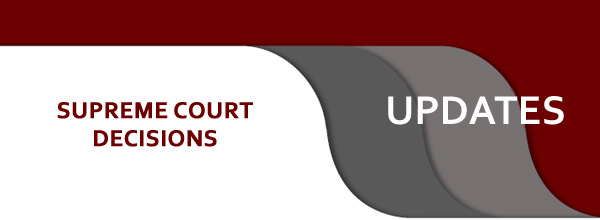
The CTA has jurisdiction to decide not only cases on disputed assessments and refunds of internal revenue taxes, but also "other matters" arising under the NIRC.
The CIR filed a Petition for Review on Certiorari under Rule 45 to assail the Decision of the Court of Tax Appeals (CTA). In the Petition, the Commissioner of Internal Revenue (CIR) maintains that the Final Decision on Disputed Assessment (FDDA) should be the adverse decision appealable to the CTA and not the Warrant of Distraint and/or Levy (WDL). The taxpayer counters that the WDL is the adverse decision appealable to the CTA and not the FDDA. The taxpayer further contends that there was no valid authority granted the one of the officers who conducted the audit, not being named in the LOA.
The Supreme Court found the Petition without merit. At the outset, the Court ruled that questions of fact are proscribed in Rule 45 petitions. The Rules of Court require that only questions of law should be raised in petitions filed under Rule 45 since factual questions are not the proper subject of an appeal by certiorari.
As to the merits of the case, the Supreme Court tilted the scales in favor of the taxpayer. The Court ruled that contrary to the CIR's argument, Section 7(a)(l) of Republic Act No. (RA) 1125, as amended by RA 9282, which confers upon the CTA the jurisdiction to decide not only cases on disputed assessments and refunds of internal revenue taxes but also "other matters" arising under the NIRC. (Commissioner of Internal Revenue vs. Manila Medical Services, Inc., G.R. No. 255473, February 13, 2023)
RE Developers must meet certain standards and must register with the DOE before they can be considered as RE Developers duly entitled to fiscal incentives, such as entitlement to zero-rated sales.
The core of the dispute in this case is whether the taxpayer, a renewable energy (RE) developer is entitled to a tax refund of the unutilized or excess creditable input VAT paid or incurred by the taxpayer for the period of January 1, 2012 to December 31, 2012, which are all attributable to its zero-rated sales for the period of January 1, 2012 to December 31, 2012.
The Supreme Court ruled that the taxpayer is not entitled to a refund of unutilized or excess creditable input VAT. The Supreme Court ruled that the RE Developer's registration with the Department of Energy (DOE) is a pre-requisite for entitlement to the VAT incentive provided by Republic Act No. 9513 such that an RE Developer's decision not to register will mean that its transactions will be subject to 12% VAT.
The DOE, pursuant to its power to implement Republic Act No. 9513, imposes various criteria for RE Developer to qualify for registration to avail of the fiscal incentives. It is not the mere fact that an entity is an RE Developer that makes such an entity entitled to the fiscal incentives under Republic Act No. 9513. In addition to the registration requirement expressly provided in Republic Act No. 9513, the DOE, pursuant to its power under Section 26 of the law, also has the authority to provide for a set of criteria that would qualify an RE Developer for registration in order to avail of the fiscal incentives. Moreover, the DOE Implementing Rules and Regulations also require RE Developers and manufacturers, fabricators, and suppliers of locally-produced RE equipment to register with the Board of Investments (BOI) as a condition for entitlement to the fiscal incentives under Republic Act No. 9513.
It is therefore clear error to conclude that all RE Developers are entitled to the fiscal incentives granted by Republic Act No. 9513. The law, as enforced through the DOE IRR, is categorical that RE Developers must meet certain standards and must register with the DOE before they can be considered as RE Developers duly entitled to fiscal incentives. (CBK Power Co. Limited v. Commissioner of Internal Revenue, G.R. No. 247918, February 1, 2023)
In the absence of a law expressly and unambiguously imposing excise tax on alkylate, the appropriate rule to be applied is the strict interpretation in the imposition of taxes such that the statute must be construed most strongly against the government and in favor of the taxpayer.
The taxpayer assailed the Decision of the CTA denying its request for refund of excise taxes it had paid in connection with its importation of alkylate.
On July 18, 2012, the Bureau of Customs (BOC) issued CMC No. 164-2012 implementing the Letter from the BIR stating that alkylate is subject to excise tax under Section 148 (e) of the Tax Code. The taxpayer then filed two administrative claims for refund of excise tax claiming that the foregoing excise taxes were erroneously and illegally imposed and collected by the Bureau of Internal Revenue (BIR).
The CIR assailed that while alkylate is not directly produced through distillation but by alkylation, its raw materials, light olefins and isobutane, are nonetheless products of distillation.
The Supreme Court found merit in the petition. It bears to point out that the taxpayer does not seek to be exempt from excise taxes on its alkylate importations. Instead, it anchors its claim for tax refund on the absence of a law that imposes excise tax on alkylate. Here, Petitioner’s claim for tax refund is not founded on any tax exemption law but on the government’s erroneous assessment and collection of excise taxes on its alkylate importations, without clear legal basis therefor. Thus, in the absence of a law expressly and unambiguously imposing excise tax on alkylate, the appropriate rule to be applied is the strict interpretation in the imposition of taxes such that the statute must be construed most strongly against the government and in favor of the taxpayer. Verily, since alkylate is not categorically covered by Sec. 148 (e) of the Tax Code, the doubt should be resolved in Petitioner’s favor. (Petron Corporation v. Commissioner of Internal Revenue, G.R. No. 255961, March 20, 2023)

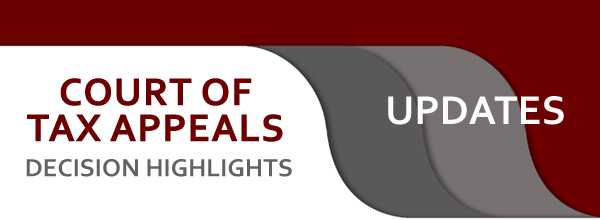
The resulting DST assessment under an LOA covering all income tax except DST is null and void.
Under LOA No. 00033788, the Revenue Officers (ROs) are only authorized to audit and examine the taxpayer for the purpose of determining any deficiency tax liability except Documentary Stamp Tax (DST) for the period from 1 January 2008 to 31 December 2008. Clearly, the ROs are authorized to determine any deficiency tax except DST. However, their examination delved into an inquiry of the taxpayer’s possible DST liability which was clearly not covered by LOA No. 00033788. Accordingly, the resulting DST assessment is null and void. (Sun Life Grepa Financial, Inc. v. Commissioner of Internal Revenue, C.T.A. Case No. 10080, May 9, 2023)
The issuance of a FAN/FLD before the lapse of the 15-day period to file a reply to the PAN is a vioaltion of the taxpayer’s right to due process rendering the assessment void.
The taxpayer received the Preliminary Assessment Notice (PAN) dated December 28, 2012 on January 9, 2013. Thus, it had until January 24, 2013 within which to file its reply to the same. However, records show that the BIR issued the Final Assessment Notice (FAN)/ Formal Letter of Demand (FLD) on January 14, 2013, or barely five (5) days after the taxpayer received the PAN. Evidently, the BIR did not wait for the taxpayer to reply to the PAN within the fifteen (15)-day period provided under the law and rules.
Clearly, the taxpayer’s right to due process was violated when the BIR issued the FAN before the lapse of the fifteen (15)-day period given to the former to respond to the PAN. Thus, the assessment issued against the taxpayer is void. Needless to say, a void assessment bears no fruit and must be slain at sight. (D.M. Wenceslao & Associates, Inc. v. Commissioner of Internal Revenue, C.T.A. Case No. 9764, May 9, 2023)
The absolute tax exemption of an educational institution is available only to non-stock, non-profit educational institutions although it may be extended to proprietary educational institutions subject to further limitations and provisions of law.
The exemption from taxation of the real properties of any educational institution which are actually, directly, and exclusively used for the said purpose is absolute.
However, the absolute tax exemption of an educational institution is available only to non-stock, non-profit educational institutions although it may be extended to proprietary educational institutions subject to further limitations and provisions of law.
Thus, the taxpayer must first prove that it is a non-stock, non-profit educational institution. However, in the Assailed Decision, it is an undisputed fact that the taxpayer is a stock and for-profit educational institution. Consequently, it is not entitled to the exemption provided by law. (Malayan Education System, Inc. v. City of Manila, C.T.A. AC No. 260 (Civil Case No. CV-14-131442), May 10, 2023)
It is settled that a party cannot, on appeal, change fundamentally the nature of the issue in the case. When a party deliberately adopts a certain theory and the case is decided upon that theory, he will not be permitted to change the same on appeal.
The CIR argues that the interest income not subjected to income tax must be added back to the taxable income of the taxpayer as it failed to prove that the said interest income was subjected to final withholding tax. On the other hand, the taxpayer assailed that its interest income from money market placements, being passive income, is not subject to regular corporate income tax but are subject to final withholding tax at the rate of 20% which must be withheld by the banks as payors thereof.
To recall, in the FAN and FLD, the CIR was of the position that the subject interest income is not passive income that should be subject to the final tax but to regular corporate income tax. In his motion for reconsideration and in the subject petition for review, the CIR changed his theory for the subject item of assessment. CIR is no longer insisting that the interest income is an ordinary income that should have been subjected to regular corporate income tax. Instead, Petitioner is arguing anew that the taxpayer failed to prove that the said interest income was subjected to final withholding tax.
It is settled that a party cannot, on appeal, change fundamentally the nature of the issue in the case. When a party deliberately adopts a certain theory and the case is decided upon that theory in the court below, he will not be permitted to change the same on appeal, because to permit him to do so would be unfair to the adverse party. Thus, the Court cannot allow the CIR to change his theory, and rule on the merits of the new theory. Having initially assessed the taxpayer for regular corporate income tax on the basis of his position that the interest income is an ordinary income, the CIR can no longer insist that the taxpayer be subjected to regular corporate income tax on said interest income as it failed to prove that said interest income has been subjected to final withholding tax. (Commissioner of Internal Revenue v. First Philippine Utilities Corporation, CTA EB No. 2500 (CTA Case No. 9431), May 24, 2023)
Administrative due process also requires judicious consideration of the matters raised therein, independent evaluation of the case, and due notification to parties of the reasons for judgment.
On October 19, 2009, the BIR issued PAN finding the taxpayer liable for deficiency income tax, value-added tax, and expanded withholding tax. Consequently, the taxpayer filed a position letter for the cancellation and withdrawal of the assessments after it received the PAN. On November 18, 2010, the CIR issued FAN/FLD. The CIR, in the FAN/FLD, no longer discussed or resolved the arguments and issues raised in the taxpayer’s Position Letter nor provided reasons for denying the same.
Verily, the FAN/FLD were issued in violation of the taxpayer’s right to due process. It is clear from the pronouncements in Ang Tibay and Avon that the requirement of administrative due process is not met sufficiently by the mere formal act of receiving a taxpayer’s defenses submitted in writing. Administrative due process also requires judicious consideration of the matters raised therein, independent evaluation of the case, and due notification to parties of the reasons for judgment. A perusal of the records of the case would show that the identity in substance between the subject PAN and the subsequent FAN/FLD, as in Avon, shows that the CIR ignored completely the taxpayer’s position letter (to the PAN) and failed to give due consideration to the arguments therein. (Kabalikat Para sa Maunlad na Buhay, Inc., CTA Case No. 8336, May 23, 2023)
All loan agreements, whether made or signed in the Philippines or abroad, when the obligation or right arises from Philippine sources or the property or object of the contract is located in the Philippines, shall be subject to the payment of DST.
The taxpayer claims that the loans and advances made to third parties are not covered by Section 179 in relation to Section 173 of the NIRC of 1997, as amended. It asserts that the said loans and advances did not involve "obligation or right arising from Philippine sources" or that the situs thereof is clearly outside the Philippines. It further asserts that since the obligation or right does not arise from Philippine sources because the "obligor" is not a resident of the Philippines, no DST under Section 179 is due. The CIR counters that DST, as defined under the Tax Code, is a tax on documents, instruments, loan agreements, and papers evidencing the acceptance, assignment, sale, or transfer of an obligation, right, or property incident thereto. He argues that Advances to/ from affiliates are in the nature of loans subject to DST under Section 173 in relation to Section 179 of the NIRC of 1997, as amended.
The Court finds with the CIR. All loan agreements, whether made or signed in the Philippines or abroad, when the obligation or right arises from Philippine sources or the property or object of the contract is located in the Philippines, shall be subject to the payment of DST. In cases where no formal agreements or promissory notes have been executed to cover credit facilities, the documentary stamp tax shall be based on the amount of drawings or availment of the facilities. Moreover, all parties to the transaction (i.e., loan transaction) are primarily liable for the DST, not only the person making, signing, issuing, accepting, or transferring the document or facility evidencing the transaction. Any of the parties thereto shall be liable for the full amount of the tax due. However, when one party is exempted from paying tax, the other party who is not exempt would be liable. (Bloomberry Resorts Corporation v. Commissioner of Internal Revenue, CTA Case No. 10193, May 28, 2023)
Section 13 of PD No. 1590 requires the following conditions to be exempt from taxes, duties, royalties, registrations, licenses, and other fees and charges: (1) payment of corporate income tax; (2) the said supplies are imported for the use of the franchisee in its transport/non-transport operations and other incidental activities; and (3) they are not locally available in a reasonable quantity, quality or price.
The taxpayer, argues that its importations of commissary and catering supplies are exempt from all taxes pursuant to its franchise to establish, operate and maintain air-transport services under PD 1590. The CIR argues that the tax exemption to the taxpayer has been abandoned pursuant to Section 13147 of the NIRC of 1997, as amended by RA No. 9334.
The Court emphasized that the taxpayer remains exempt from taxes, duties, royalties, registrations, licenses, and other fees and charges, provided the following conditions are fulfilled: (1) payment of corporate income tax; (2) the said supplies are imported for the use of the franchisee in its transport/non-transport operations and other incidental activities; and (3) they are not locally available in reasonable quantity, quality or price.
All of the foregoing conditions were met by the taxpayer except the last condition. With regard to the third condition, the Court found the evidence presented by the taxpayer insufficient. It failed to present sufficient and convincing evidence to prove that the imported tobacco and alcohol products were not locally available in reasonable quantity, quality, or price, at the time of importation. Such being the case, the taxpayer has not fulfilled all conditions to be entitled to the tax exemption granted under Section 13 of PD No. 1590. (Philippine Airlines, Inc. v. Commissioner of Internal Revenue, CTA Case No. 10311, May 30, 2023)
The validity of the final assessment is a distinct matter from the issue of prescription of collection of taxes.
The CIR disputes the CTA’s jurisdiction over the Petition given that the taxpayer failed to file an administrative protest to the FLD/FAN, and hence, said assessment has become final and executory. In refutation, the taxpayer emphasized that it is the prescription on the collection of taxes that it is assailing, and not the assessment.
The CTA ruled in favor of the taxpayer. The Court explained that the amended FLD/FAN dated December 9, 2010, superseded the original FLD/FAN dated October 12, 2009. Said amended FLD/FAN attained immutability because the taxpayer failed to prove that it validly filed an administrative protest thereto. This means that the validity or correctness of the assessment may no longer be questioned on appeal. Yet, it clarified that the validity of the final assessment is a distinct matter from the issue of prescription of collection of taxes.
For this reason, the issue of prescription of collection of taxes may be addressed separately, despite the incontestability of the final assessment.
Here, the CIR lost its right to collect from the taxpayer, the deficiency VAT and compromise penalties for TY 2006, under the amended FLD/FAN dated December 9, 2010. To be precise, the amended FLD/FAN was mailed to the taxpayer on December 22, 2010. Counting three (3) years from December 22, 2010, petitioners had until December 22, 2013 to collect the VAT and compromise penalty due under said amended FLD/FAN. Thus, the WDL, and WOG, respectively issued on March 8 and 16, 2018, are barred by prescription. (Commissioner of Internal Revenye and BIR Regional Director, Region 12, Bacolod City vs. Anapi Multi-Purpose Cooperative, CTA EB No. 2543 (CTA Case No. 9787, May 11, 2023)
If revenue generation is the primary purpose and regulation is merely incidental, the imposition is a tax; but if regulation is the primary purpose, the fact that incidental revenue is also obtained does not make it an imposition of a tax.
A provision of the Watershed Code of the City of Davao provides for an annual Environmental Tax to be imposed on all agricultural and other economic undertakings in the Agro-forestry/Non-Tillage Areas and Prime Agricultural Areas of not less than 50 hectares at the rate of Twenty-Five Centavos (Php0.25) per square meter. Pursuant to this, the City Treasurer issued an assessment against a taxpayer. Not agreeing with the assessment, the taxpayer paid under protest the assessment. Thereafter, the taxpayer elevated the case to the Regional Trial Court of Davao City (RTC), CTA in Division and En Banc after receiving an unfavorable rulings/decisions.
The CTA in Division rendered a Decision denying the Petition for Review on jurisdictional grounds. In arriving at its decision, the Court in Division agrees with the RTC's conclusion that the twenty-five (Php0.25) centavos Environmental Fee is not a tax but a regulation fee. Hence, considering that the imposition is a regulatory fee and not a local tax, the Court in Division ruled that it has no jurisdiction over the case. On appeal to the CTA En Banc, the taxpayer contends that the original petition primarily involves a local tax issue as it emanates from an assessment coupled with Tax Orders of Payment issued by the City Treasurer.
The CTA En Banc is not persuaded. The latter elucidated the difference between the imposition of a regulatory fee vis-à-vis a local tax, to wit: if revenue generation is the primary purpose and regulation is merely incidental, the imposition is a tax; but if regulation is the primary purpose, the fact that incidentally revenue is also obtained does not make the imposition a tax.
Considering that the Environmental Tax under the Watershed Code of Davao City is not in the nature of local taxes, the Court in Division correctly dismissed the petition for lack of jurisdiction. (Dole Philippines Inc. – Stanfilco Division vs. The Sangguniang Panlusod of the City of Davao et al., CTA EB No. 2461 (CTA AC No. 25, May 12, 2023)
The permit fee to slaughter, which is the subject of the LGU's orders of payment and assessments and/or the taxpayer's payments under protest, is in the nature of a license fee and, thus, not a tax.
The taxpayer argues that the lower court erred in dismissing its Petition on the ground that the regulatory fees imposed by the local government units are outside its appellate jurisdiction under Section 7(a)(3) of RA 1125, as amended. It takes the position that the lower court has jurisdiction over regulatory fees imposed by the local government unit, pursuant to its taxing authority under the Local Government Code. It submits that the term "local tax cases" in the law should be interpreted to mean questions involving the exercise by the local government of its delegated powers of taxation under its tax ordinance.
A reading of Section 367(a) within the context of the other related provisions under Article Twelve - Slaughter and Corral Fees, brings to light the general welfare purpose of these provisions. To reiterate, the purpose of these provisions collectively and the imposition of the permit fee is to regulate the activities pertaining to the slaughter of animals, in general, and the slaughter of live birds/poultry, in particular.
Based on the foregoing legal authorities, the imposition of Davao City is unmistakably in the nature of a fee for the purpose of regulating the business activity of the taxpayer. The permit fee to slaughter is, therefore, not a tax to raise revenues for the city but is imposed on SMFI in order for it to engage in a particular trade or business. The permit fee to slaughter, which is within the power of respondent to impose, can only be classified as a fee for the purpose of regulating a specific business activity imbued with public interest because the activity, i.e., the slaughter of live birds/poultry in its Toril and Tugbok dressing plants, can impact public health, hygiene and sanitation. (San Miguel Foods, Inc. v. Office of The City Treasurer, City of Davao, Represented By Bella Linda N. Tanjili, City Treasurer, Case EB 2535 (CTA AC NO. 210), May 18, 2023)

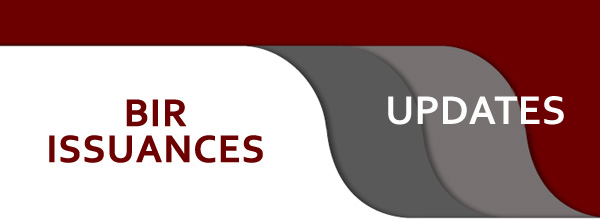
RR No. 4-2023, May 4, 2023
This expands the coverage of taxpayers mandated to file tax returns through Electronic Bureau of Internal Revenue Forms (eBlRForms).
This amends Section 2 of RR No. 9-2016 which further expand the coverage of taxpayers mandated to file tax returns through Electronic Bureau of Internal Revenue Forms (eBlRForms), to wit:
1. Accredited Tax Agents/Practitioners and all its client-taxpayers;
2. Accredited Printers of Principal and Supplementary Receipts/Invoices;
3. One-Time Transaction (ONETT) taxpayers who are classified as real estate dealers/developers; those who are considered as habitually engaged in the sale of real property and regular taxpayers already covered by eBIRForms. Thus, taxpayers who are filing BIR Form No. 1706, 1707, 1800, 1801 and 2000-0T (for BIR Form No. 1706 only) are excluded in the mandatory coverage from using the eBIRForms;
4. Those who shall file a "No Payment Return";
5. Government-Owned-or-Controlled Corporations (GOCCs);
6. Local Government Units (LGUs), including Barangays; and
7. Cooperatives registered with National Electrification Administration (NEA) and Local Water Utilities Administration (LWUA).
RR No. 5-2023 dated May 7, 2023
This amends RR No. 5-2021 on the requirements for availing the Income Tax exemption of foreign-sourced dividends received by a domestic corporation.
In order to avail of the income tax exemption of the foreign-sourced dividends, the domestic corporation shall:
a. attach a “Sworn Statement,” following the template provided in these Regulations, to the Annual Income Tax Return (AITR) pertaining to the taxable year in which the foreign-sourced dividends were received; and
b. attach to the AITR pertaining to the year immediately following the year of receipt of the foreign-sourced dividends a “Sworn Declaration.”
Compliance with the above requirements is sufficient in order to avail of the income tax exemption. However, in case of partial or non-utilization of the foreign-sourced dividends, the domestic corporation shall pay the corresponding income tax due thereon, inclusive of surcharge, interest, and penalties, by amending the AITR filed for the particular period. In the event that the amendment is already prohibited due to the existence of an audit, the income tax shall be paid using payment form (BIR Form 0605).
RMC No. 47-2023, May 3, 2023
This reiterates the proper time of remittance of Withholding Taxes by National Government Agencies (NGAs) and instrumentalities, Local Government Units (LGUs), and Government Owned and Controlled Corporations (GOCCs).
Per Section 2.57.4 of Revenue Regulations No. 2-98, the obligation of the payor to deduct and withhold the tax under Section 2.57 of said Regulations arises at the time an income payment is paid or payable, or the income payment is accrued or recorded as an expense or asset, whichever is applicable, in the payor’s books, whichever comes first. Provided, however, that where income is not yet paid or payable but the same has been recorded as an expense or asset, whichever is applicable, in the payor's books, the obligation to withhold shall arise in the last month of the return period in which the same is claimed as an expense or amortized for tax purposes.
On the other hand, the accrual basis of accounting was already prescribed by the Commission on Audit in the Government Accounting Manuals for NGAs and LGUs since 2002, pursuant to the Philippine Public Sector Accounting Standards that are harmonized with the International Public Sector Accounting Standards. Hence, a long period of departure from the cash basis of accounting which is, apparently, still being adopted by these concerned government entities where their duty to deduct and withhold the tax is erroneously grounded.
RMC No. 49-2023, May 5, 2023
This provides updates on the floor price of cigarettes, heated tobacco, vaporized nicotine and non-nicotine products.
This provide updates on the floor price of cigarettes, heated tobacco, vaporized nicotine and non-nicotine products and reiterates the imposition of corresponding penalties, sanctions, and liabilities for non-compliance. Selling of tobacco products at a price lower than the combined Excise and Value-Added Taxes imposed under the law shall be prohibited.
A. Cigarettes
| Packaging | Content per Packaging | Production Cost/ Total Landed Cost | Excise Tax | VAT | Total Tax | Floor Price |
| Pack | 20 Sticks | ₱42.32 | ₱60.00 | ₱12.28 | ₱72.28 | ₱114.60 |
| Ream | 10 Packs | ₱423.20 | ₱600.00 | ₱122.80 | ₱722.80 | ₱1,146.00 |
B. Heated Tobacco Products
| Packaging | Content per Packaging | Production Cost/ Total Landed Cost | Excise Tax | VAT | Total Tax | Floor Price |
| Pack | 20 Sticks | ₱75.00 | ₱32.50 | ₱12.90 | ₱45.40 | ₱120.40 |
C. Vapor Products
C.1 Nicotine Salt or Salt Nicotine
| Packaging | Pack/FIll | Content per Packaging | Production Cost/ Total Landed Cost | Excise Tax | VAT | Total Tax | Floor Price |
| Pod | 1 | 2ml | ₱74.57 | ₱104.00 | ₱21.43 | ₱125.43 | ₱200.00 |
| Pod | 1 | 4ml | ₱108.94 | ₱208.00 | ₱38.03 | ₱246.03 | ₱354.97 |
C.2 Connventional 'Freebase' or 'Classic' Nicotine
| Packaging | Pack/FIll | Content per Packaging | Production Cost/ Total Landed Cost | Excise Tax | VAT | Total Tax | Floor Price |
| Bottle | 1 | 10ml | ₱100.00 | ₱60.00 | ₱19.20 | ₱79.20 | ₱179.20 |
| Bottle | 1 | 30ml | ₱180.00 | ₱180.00 | ₱43.20 | ₱223.20 | ₱403.20 |
RMC No. 53-2023, May 11, 2023
This clarifies the entitlement of economic zone developers and operators to the VAT zero-rating on local purchases of goods and services directly and exclusively used in the registered project or activity.
The BOI Memorandum Circular (MC) No. 2022-003 which amended the Specific Guidelines of Activities in Support of Exporters under the 2020 Investment Priorities Plan (IPP), also known as the transitional Strategic Investment Priority Plan (SIPP), included the development and operation of economic zones; and industrial parks and buildings for exporters, as "Activities in Support of Exporters."
At least seventy percent (70%) of the leasable/saleable areas shall be dedicated to exporters. Revenues arising from clients/tenants engaged in activities that are not allowed pursuant to the definition of a registered business enterprise under Section 293(M) of the Corporate Recovery and Tax Incentives for Enterprises (CREATE) Act will not be entitled to the Income Tax Holiday incentive.
Phased development of an economic zone or industrial park may be allowed, provided the whole project is completed within five (5) years unless otherwise approved by the Board of the concerned IPA. These amendments shall apply to all projects qualified under the CREATE Act. Based on the foregoing, the ecozone developer and operator may be classified as export enterprise if it meets the qualifications stated above, in which case, it shall also be entitled to the VAT incentives under the CREATE Act.
In case an enterprise is not qualified based on the amended guidelines, the ecozone developer or operator will be classified as a domestic market enterprise under Item D(I)(8)(j) of the General Policies and Specific Guidelines to Implement the 2020 IPP which covers the development of domestic industrial zones, as circularized by the BOI thru MC No. 2021-001. Consequently, it shall not be entitled to the VAT incentives under the CREATE Act.
RMC No. 57-2023, May 19, 2023
This publishes the updated list of Registered Manufacturers, Importers, and Exporters, of Cigarettes, Heated Tobacco Products, Vapor Products, and Novel Tobacco Products.
This publishes the Updated List of Registered Manufacturers/Importers/Exporters with the Corresponding Product Brands/Variants of Cigarettes, Heated Tobacco Products, Vapor Products and Novel Tobacco Products as of May 15, 2023 and integrates the requirements for compliance purposes.
The said List reflecting the following product categories is attached as Annexes A to H in the Circular:
a. Manufacturers of Locally Produced Cigarettes (Domestic)
b. Manufacturers of Locally Produced Cigarettes (Export)
c. PEZA-Registered Manufacturers of Cigarettes
d. Importers of Cigarettes
e. Manufacturers of Vapor Products
f. Importers of Vapor Products
g. Importers of Heated Tobacco Products
h. Importers of Novel Tobacco Products
RMC No. 58-2023 dated May 19, 2023
Clarifies the policies and guidelines on the issuance and validity of TIN Card and Certificate of Registration.
The Certificate of Registration (COR) printed in old template/yellow-orange color is still valid and does not expire, as long as the information and details printed therein are still up to date.
Replacement of COR shall only be made if there are updates or changes in the information printed on the face of COR.
The electronic COR generated by the Philippine Business Hub (PBH) and Online Registration and Update System (ORUS) printed by taxpayers is valid and does not require a signature. The electronic COR bears a QR Code that can be validated online when scanned. The COR or electronic COR issued by the ORUS or PBH is required to be posted conspicuously in the place of business.
RMC No. 59-2023, May 19, 2023
This announces the availability of the revised BIR Form No. 2550Q (Quarterly VAT Return) January 2023 (ENCS).
The revised BIR Form No. 2550Q is already available in the BIR website (www.bir.gov.ph) under the BIR Forms-VAT/Percentage Tax Returns Section. However, the Form is not yet available in the Electronic Filing and Payment System (eFPS) and Electronic Bureau of Internal Revenue Forms (BIRForms). Thus, eFPS/eBIRForms filers shall continue to use BIR Form No. 2550Q in the eFPS and in Offline eBIRForms Package v7.9.4 in filing and paying the VAT payable/due. Once the return becomes available in the eFPS and in the Offline eBIRForms Package, a separate revenue issuance shall be released to announce its availability. Manual filers shall download and print the PDF version of the revised BIR Form 2550Q, and must fill out all the applicable fields. Otherwise penalties under Sec. 250 of the Tax Code, as amended, shall be imposed. Payment of the tax due thereon, if any, shall be made thru either: (1) online payment or (2) manual payment.
RMC No. 61-2023, May 24, 2023
This clarifies procedures in the processing of taxpayer's request for stamping of Income Tax Returns/Annual Income Tax Returns (ITRs/AITRs) electronically filed through eBIRForms.
Pursuant to Revenue Memorandum Circular No. 32-2023, “No Payment AITRs” shall be filed electronically through the eBIRForms. Thus, taxpayers no longer need to file "No Payment AITRs" manually. Revenue District Offices (RDOs) may still manually stamp printed electronically filed AITRs for requesting taxpayers who can provide a letter request, with attached supporting documents, stating the need for their respective returns to be manually stamped "Received" by the BIR, as a requirement or proof of filing and payment of their taxes here in the Philippines (e.g. expatriates of multinational companies), or for whatever legal purpose it may serve.
RMC No. 63-2023, May 31, 2023
This revokes BIR Ruling Nos. 038-2001 (dated September 10, 2001) and 046-1995 (dated March 3, 1995).
This revokes BIR Ruling Nos. 038-2001 (dated September 10, 2001) and 046-1995 (dated March 3, 1995) which ruled that Clark Development Corporation (CDC) is considered a business enterprise because it was formed in accordance with the Philippine Corporation Law and existing rules and regulations by SEC and is performing activities that are proprietary in nature. Therefore, CDC is entitled to the same privileges as other enterprises operating within the Clark Special Economic Zone such as a preferential tax rate based in lieu of local and national internal revenue taxes.
While it is true that CDC is a private corporation and performs activities, which are proprietary in nature, the fact still remains that it is a GOCC entrusted with the responsibility of carrying out regulatory functions. As such, it does not stand on equal footing with business enterprises operating within CSE and is thereby precluded from claiming the same privileges available to them. Despite being structured as a stock corporation, it is evident that CDC is a GOCC that operates and performs as a regulatory agency. Thus, unless there is a law that expressly states otherwise, CDC must be treated on par with other GOCCs regardless of its formation or the nature of its operations. Consequently, its income shall be subject to income tax provided under Section 27(C) of the Tax Code.
RMO No. 16-2023, May 17, 2023
This provides supplemental guidelines and procedures for the implementation of RMO No. 40-2022.
This provides supplemental guidelines and procedures on the implementation of Revenue Memorandum Order (RMO) No. 40-2022 to ensure effective conduct of apprehension/seizure and detention of unlicensed/unregistered articles. The BIR personnel coming from the concerned team of the BIR STRIKE Group shall be authorized to conduct covert surveillance activities on identified business establishments for possible violations of the provision of the National Internal Revenue Code (NIRC) of 1997, as amended, based on a validly issued Mission Order (MO) signed by the Deputy Commissioner – Operations Group (DCIR-OG), Assistant Commissioner – Large Taxpayers Service (ACIR-LTS) or the concerned Regional Director (RD).
The subject, as part of due process, should be served with the MO, Checklist of Documentary Requirements at the start of the enforcement activity and whenever applicable, Apprehension Slip/s and Inventory Sheets on the last day of the enforcement action and Demand to Comply. The apprehended items, which are in violation of the provision of the NIRC of 1997, as amended, shall be considered evidence against the subject. It is the duty of the Apprehending Team to check the proper turnover of evidence to the Storage of Facility.
If the subject fails to comply and/or disagrees with the initial findings stated in the Demand to Comply, the BIR Strike Team shall issue a Collection Letter within five (5) days, for the collection of deficiency Excise Taxes arising from the enforcement operation. No PAN shall be issued when the excise due on excisable articles has not been paid pursuant to Section 228 of the NIRC of 1997, as amended. If the Excise Tax discrepancies remained unsettled/unpaid, the corresponding FAN and FLD shall be issued and served upon the subject.
In any case, the subject offers to pay the deficiency excise taxes and corresponding penalties, the offer of payment must originate from the subject. The imposition of the compromise penalties shall be in accordance with revised schedule of compromise penalties prescribed under existing revenue issuances and regulations. However, imposition of/acceptance of compromise penalties are amounts suggested for the settlement of criminal offense, thus, proper evaluation of the case must be made to determine if the offer to pay the compromise penalty by the subject should be accepted by the BIR Strike Team.. The result of the investigation and/or operation pursuant to this Order shall be forwarded to the Prosecution Division for Large Taxpayers Service or the Legal Division of the concerned Revenue Region, as the case may be, for evaluation and filing of appropriate legal action in accordance with existing laws, rules and regulations. A Demand Before Suit shall be issued for criminal complaints involving the collection of tax liabilities.
RMO No. 18-2023, May 19, 2023
This amends the policies and procedures in the issuance of the Authority to Cancel Assessment (ATCA) as provided in Revenue Memorandum Order (RMO) No. 33-2018.
The issuance of ATCA relative to protested tax assessments has been identified as redundant. Hence, this Order is issued to remove Item III.1 (a) from among the instances requiring the issuance of ATCA as mentioned in RMO No. 33-2018. This particular item pertains to the issuance of ATCA for protested assessment which is not yet final and delinquent. All other items listed thereof shall remain to be in effect as these all pertain to tax assessments that were reported and determined as “delinquent account” but later approved for a compromise settlement, amnesty or abatement of penalties, or declared prescribed, including tax assessments determined to be invalid or worthless.
RMO No. 20-2023, May 30, 2023
This amends further RMO No. 21-84, as amended.
The issuance of ATCA relative to protested tax assessments has been identified as redundant. Hence, this Order is issued to remove Item III.1 (a) from among the instances requiring the issuance of ATCA as mentioned in RMO No. 33-2018. This particular item pertains to the issuance of ATCA for protested assessment which is not yet final and delinquent. All other items listed thereof shall remain to be in effect as these all pertain to tax assessments that were reported and determined as “delinquent account” but later approved for a compromise settlement, amnesty or abatement of penalties, or declared prescribed, including tax assessments determined to be invalid or worthless.
| Chairperson | Assistant Regional Director |
| Member | Chief, Finance Division |
| Member | Chief, Administrative and Human Resource Management Division |
| Witness | BIR Regional COA Auditor |
Said Committee shall discharge certain functions such as (1) appraise and conduct an inventory of all obsolete, damaged, or cancelled accountable forms for disposal; (2) prepare and sign inventory report and submit the same to the Regional Director; (3) dispose the obsolete, damaged, or cancelled accountable forms in accordance with existing COA rules and regulations; (4) after every destruction, transmit a Report on the Disposal of Accountable Forms (BIR Form 2623) and Certificate of Destruction to the CIR, Attention: Chief, Accountable Forms Division, among others.


SEC-OGC Opinion No. 23-04
This enumerates the remedies available for lost Stock and Transfer Book (STB).
The crux of the controversy revolves around the non-recording of share transfers in the company’s Stock and Transfer Book (STB) which was allegedly due to the loss of the STB and Certificate of Stocks by the resigned corporate secretary.
The SEC opined that in case the STB is lost or destroyed, an action for the reconstitution of the same shall be filed so that proper entries therein can be made. The reconstituted STB thereafter must be registered with the Commission, accompanied by a sworn statement executed by any responsible corporate officer setting forth the circumstances attending the loss.
Furthermore, the following are the other remedies available to an assignee or transferee of a share of stock:
1. File suit for specific performance of an express or implied contract
2. File for an alternative relief by way of damages where specific performance cannot be granted; and
3. File a petition for mandamus to compel the issuance of a certificate.
The Commission emphasized that the duty of the corporation to transfer is a ministerial one and if it refuses to make such transaction without good cause, it may be compelled to do so by mandamus. However, the writ will only be granted if it is shown that the transferee has no other plain, speedy and adequate remedy and that there are no unpaid claims against the stocks whose transfer is sought to be recorded.
An action for specific performance is likewise viable requiring exact performance against the transferor who refuses or neglects to endorse the certificate of stock and to provide for an instruction to transfer the same in the name of the transferee.
Alternatively, an aggrieved party may ask for damages. This stems from the fact that a corporation has a ministerial duty to issue a certificate of stock to a stockholder who has fully paid for his subscription. Should the corporation refuse upon demand to issue a stock certificate to the person entitled thereto, the latter may sue the corporation for damages.

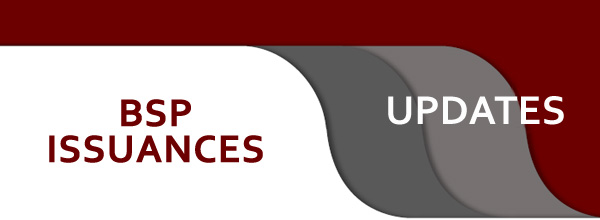
BSP Memorandum No. M-2023-017,
May 4, 2023
This provides for the extension of the Deadline for Compliance of BSFI Clients with Subscriber Identity Module (SIM) Registration.
This provides that the deadline for compliance with “Subscriber Idenitty Module (SIM) Registration Act” has been extended by 90 days from April 26, 2023 to July 2023.
The BSP reiterates its call for BSFIs to take proactive measures to ensure that their clients are aware of and comply with the SIM registration requirement within the new prescribed deadline in order for their access to payments and financial services to proceed smoothly.
BSP Memorandum No. M-2023-018,
May 17, 2023
This provides for the cancellation and replacement of the Bangko Sentral Registration Documents (BSRDs).
This provides that the link below under Memorandum No. M-2023-016 dated April 26,2023 covering the list of original BSRDs (issued in hardcopy) and provisional BSRDs (issued in electronic copy) pertaining to the registration of investments of non-residents in resident investee firms which were cancelled and replaced from April 2020 to December 2022 due to changes/transfers, etc. in these investments pursuant to provisions of the Manual of Regulations on Foreign Exchange Transactions (FX Manual) , as amended, has been updated as of the first quarter of 2023.
https://www.bsp.gov.ph/Price%20Stability/Download%20Section/List_of_Cancelled_and_Replaced_BSRDs.pdf
These previously issued BSRDs have been cancelled/replaced and should not be honored if presented for purchase of foreign exchange for capital repatriation or remittance of earnings, pursuant to Section 38 of the FX Manual.
BSP Memorandum No. M-2023-019,
May 29, 2023
This prescribes for Customer Due Diligence (CDD) on Designated Non-Financial Business and Profession (DNFBP) Customers.
This prescribes that all BSFIs strictly perform CDD on their DNFBP customers. CDD covers, among others:
1. Identifying and verifying the true identity of DNFBP customers and beneficial owner/s based on official documents or other reliable, independent source documents, data or information. Covered persons dealing with customers who are DNBFPs (e.g. jewelry dealers, dealers in precious metals, and dealers in precious stones, company service providers, lawyers and accountants and real estate developers and brokers) should require the presentation of the Provisional Certificate of Registration (PCOR) and /or the Certificate of Registration (COR) with the AMLC as part of the CDD.
2. Understanding and, as appropriate, obtaining information on the purpose and intended nature of the business relationships; and
3. Conducting ongoing due diligence on the business relationship and scrutiny of transactions undertaken throughout the course of the relationship.
Under existing regulations, where a covered person is unable to comply with the relevant CDD measures, considering a risk-based approach, it shall (a) not open the account, commence business relations, or perform the transaction; or (b) terminate the business relationship; but in both cases, it shall consider filing a Suspicious Transaction Report (STR) in relation to the customer.

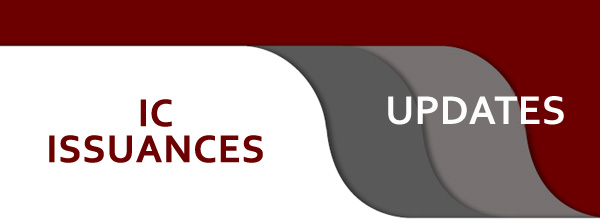
IC Legal Opinion
No. 2023-14
This provides for an opinion on Electronic Sale of Insurance Products by Intermediaries..
This is a request for the Commission’s opinion regarding the electronic sale of insurance products by intermediaries through the use of a mobile application (App) where licensed insurance companies could sell non-life insurance policies, among others. In return, the intermediary shall receive either a referral fee or a revenue share.
The Commission opined that the intermediary company, in offering insurance products in the App, is considered an insurance provider. However, the intermediary company should be licensed to consider its electronic commerce activity legal. Under CL No. 2014-47, any commercial activity that involves buying, selling, or providing insurance products and services online or via internet is considered electronic commerce. Nevertheless, the same issuance mandates a person engaged in electronic commerce to have a license.
It must first secure a Certificate of Authority from the Commission for a specific license it seeks to apply. With respect to the use of the App, the intermediary company should ask for prior approval from the commission. The mobile application should be registered with major digital platforms like Apple, Inc App Store and Google, Inc. Google Play and Microsoft Windows Marketplace. The mobile application insurance shall only be accessible and used within the Philippine territory and only approved insurance products shall be distributed in the mobile application. Payment of the insurance product availed through the use of the mobile insurance application may be through automatic deduction to the existing load of the user to the network carrier, billed through the postpaid plan, deducted to existing electronic wallet, use of credit or debit card, and use of any accredited online payment system.
The filing for the application for the use of mobile application shall be before the Commission, through the Regulation Enforcement and Prosecution Division.

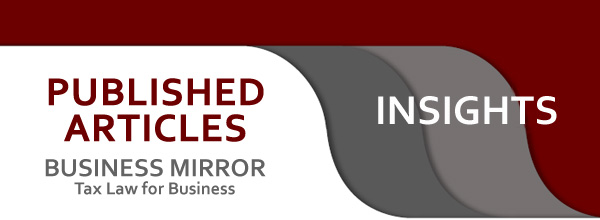
Ripples of Premature Tax Collection
By Atty. Irwin C. Nidea Jr.
The law creating the Court of Tax Appeals (“CTA”) provides that no appeal taken to the CTA from the decision of the Commissioner of Internal Revenue (“CIR”) shall suspend the payment, levy, distraint, and/or sale of any property of the taxpayer for the satisfaction of his tax liability as provided by existing law: Provided, however, That when in the opinion of the CTA the collection by the CIR may jeopardize the interest of the Government and/or the taxpayer the Court at any stage of the proceeding may suspend the said collection and require the taxpayer either to deposit the amount claimed or to file a surety bond for not more than double the amount with the Court.
There are three important items that must be considered here: 1. No appeal taken to the CTA from the decision of the CIR shall suspend the payment of tax; 2. Only the CTA can stop the CIR from enforcing collection at any stage of the proceedings before the court; 3. What will be satisfied by the payment of tax is a liability as provided by existing law.
In the first item, it would appear that the CIR has an immense power that nobody can stop. If the taxpayer’s protest is denied and the CIR issues a Final Decision on Disputed Assessment (“FDDA”), the amount of tax liability as found in the FDDA is already demandable. Even an appeal to the CTA cannot stop the CIR from enforcing collection.
This power, however, is tamed by the second item. The CTA can order the suspension of the payment of tax. It is only at the CTA where taxpayers can seek redress. The Metropolitan Trial Court, Regional Trial Court and even the Court of Appeals are not blessed with this power. To avail of this remedy, taxpayers must file a motion for suspension of collection tax before the CTA. A hearing is usually set to hear the motion where taxpayers must convince the court that irreparable damage looms if the BIR is allowed to collect. In the event that the CTA orders the suspension of tax, it can also order the taxpayer to pay a bond that is not more than double the amount of the alleged tax due. But the bond may be waived if certain conditions are met.
Unfortunately, the interplay between these first two items, which are supposed to check and balance the rights of the government and the taxpayers, tilt in favor of the former. I observe that recently, the CIR is not exercising restraint in enforcing collection. Even if an assessment is still disputed or appealed at the CTA and there is already a pending motion for suspension of collection of tax, warrants of garnishment are still being issued and worse, banks are ordered to transfer the money to the national treasury. When this happens, the motion for suspension of collection of tax becomes moot. The CTA may no longer act on it and rule that there is nothing more to suspend.
Taxpayers are in a race against time and sometimes they feel helpless. They can only pray that the CTA will act on their motion for suspension of collection of tax with the same haste and eagerness as the BIR’s efforts to collect. The CTA has the power to suspend the collection of tax anytime, as provided by its rules. Unlike the rules of court, the CTA rules do not mandate that a hearing be conducted for the court to rule for or against the taxpayer. The CTA may be convinced that a suspension order is warranted, by just examining the pleadings. I believe that it can also issue a temporary suspension order while it conducts hearings on the motion. If collection is premature, the more reason that it can unilaterally wield its immense power.
The CTA need not use its power to suspend if the CIR recognizes the limitations of its power. The third item as provided above provides that what should be satisfied by the payment of tax is a liability as provided by existing law. The Tax Code provides that it is only upon failure of the person to pay the delinquent tax or delinquent revenue within the period prescribed by the Bureau of Internal Revenue (“BIR”) that a warrant of distraint of personal property may be issued. Delinquent tax is what is being referred to as the liability as provided by law.
A delinquent account as a tax due from a taxpayer arising from the audit of the BIR which had been issued Assessment Notices that have become final and executory due to the following instances: a. Failure to pay the tax due on the prescribed due date provided in the FAN/FLD and for which no valid Protest, whether a request for reconsideration or reinvestigation, has been filed within thirty (30) days from receipt thereof; b. Failure to file an appeal to the CTA or an administrative appeal before the CIR within thirty (30) days from receipt of the decision denying the request for reinvestigation or reconsideration; or c. Failure to file an appeal to the CTA within thirty (30) days from receipt of the Decision of the CIR denying the taxpayer's administrative appeal to the FDDA.
In the Central Luzon Drug case, the CTA En Banc reminded the CIR that the civil remedies for collection of taxes should not be used at will but only when the taxes sought to be collected have already become delinquent. The Court said that while it appreciates the passion by which the CIR is performing his mandated duty to collect the necessary funds for the operation of the government, the CIR is given a stern warning not to repeat the present grievous action lest the government appear to be abusive of its power rather than protective of the interests of its people.
No less than the Supreme Court in the recent LRT case has ruled that a warrant of distraint and levy is premature and consequently void if the taxpayer filed a protest to the assessment that remains unresolved. In other words, the assessment is still disputed. The SC ruled that only delinquent tax may be collected by the BIR.
I hope that the BIR will not abuse its power and exercise restraint. It must realize that behind the prematurely collected hundreds of millions or even billions of pesos are employees that have been terminated, families that are left with no source of living and micro economic shocks that will create ripples - and possible accountability.
----------------------------------------------
For inquiries on the article, you may call or email
ATTY. IRWIN C. NIDEA JR.
Senior Partner
T: +63 2 8403 2001 loc. 330
This email address is being protected from spambots. You need JavaScript enabled to view it.


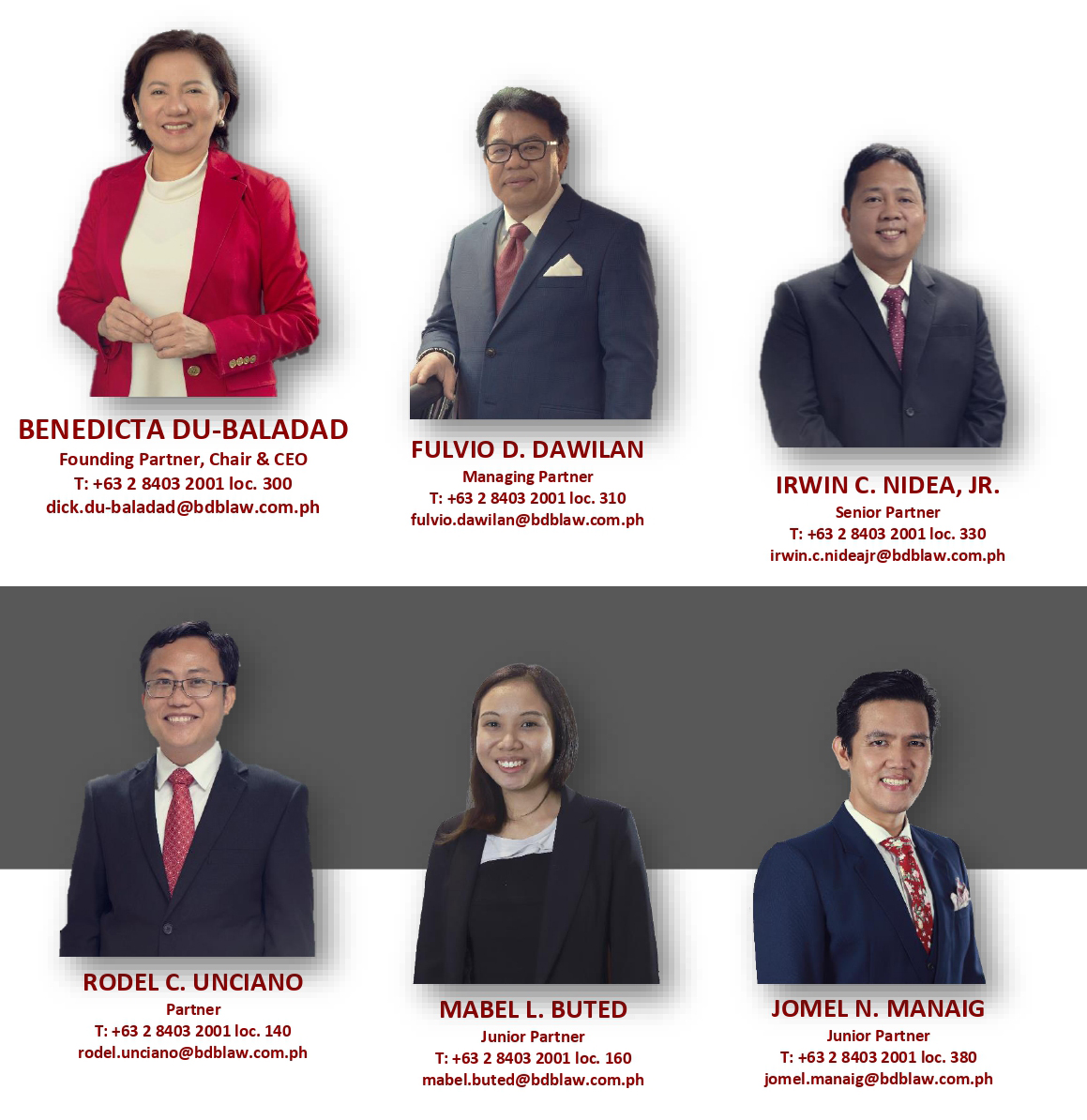
DISCLAIMER: The contents of this Insights are summaries of selected issuances from various government agencies, Court decisions and articles written by our experts. They are intended for guidance only and as such should not be regarded as a substitute for professional advice.
Copyright © 2023 by Du-Baladad and Associates (BDB Law). All rights reserved. No part of this issue covered by this copyright may be produced and/or used in any form or by any means – graphic, electronic and mechanical without the written permission of the publisher.





